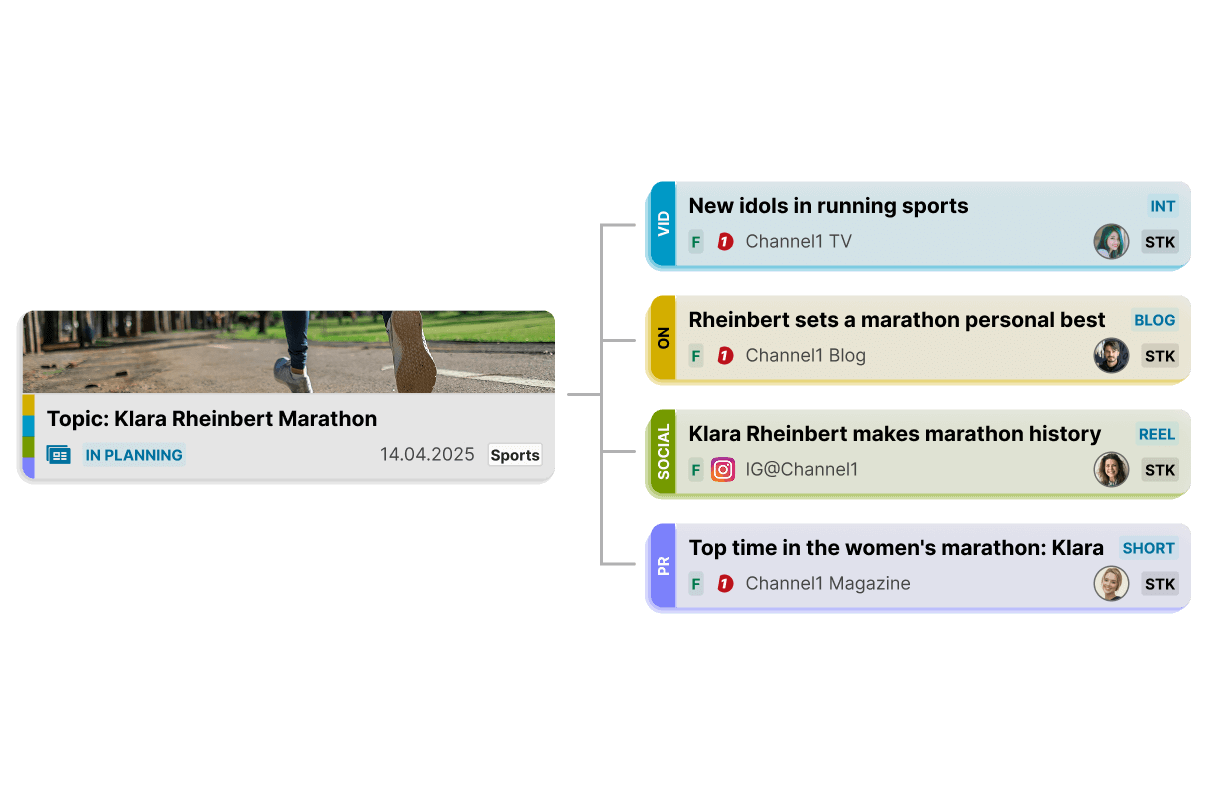Publishing content daily, staying present across all channels, and still not wasting resources – it’s a balancing act many editorial and content teams know. Often, significant effort goes into topics that are only published once. At the same time, duplicate work happens because the overview is missing.
Content recycling – often called content repurposing – strategically reuses existing material to ease the workload for teams. And it boosts reach without the need to produce more.
Repurpose content instead of reinventing it
Whether it’s a report, an interview, or a social clip – most formats hold more potential than is used at first. Content recycling or content repurposing, means turning existing material into new formats: for different platforms and multichannel publishing, for new target groups, or entirely different formats – sometimes extended, sometimes condensed.
This not only saves time but also supports sustainable content strategies:
Less duplicate work
by reusing existing content
More reach
by publishing across
multiple channels
Better planning
through more efficient
use of resources
Especially in fast-paced newsrooms, a smart structure makes execution easier.
Why story-centric workflows make content recycling easier
Those who plan content in a story-centric way automatically create the best foundation for content recycling. When posts aren’t stored individually but systematically organized in topic clusters, past content is easier to find, compare, and reuse.
A typical example: every year, a team prepares content on topics like “heat waves” or “harvest festivals.” Instead of starting research from scratch each time, they can draw on existing reports, interviews, and data – all structured and bundled in the system. This creates a solid foundation from existing content that can be updated, reweighted, or repurposed for other platforms.
Thematic bundling not only makes content easier to find but also extends its lifespan – a real efficiency boost for editorial teams and corporate newsrooms.
Recycle with structure: How Newsmind Stories makes content efficient to use
For sustainable content creation to be more than just good intentions, teams need tools that actively support content recycling. That’s why we built features in Newsmind Stories designed to make reusing content especially easy for editorial and content teams:
1. Bundle, filter, and structure content
Content can be clearly grouped into topics – for example, under a keyword like “climate change” or “strawberry season.” This way, content teams have all related stories and research in one digital place, accessible anytime at a glance. With smart search and filter functions, previously created content can also be found again quickly.

Group content by topic and avoid duplicate work
2. Duplicate existing stories or use them as templates
Why start from scratch? With just a few clicks, teams can copy existing pieces and adapt them for new contexts instead of creating everything anew. This brings more consistency and efficiency by saving resources and using them where they matter most.
3. Related Topics – avoid duplicate work
The AI in Newsmind Stories detects when similar topics already exist in the system, suggests matching content, and shows editors right away who’s already working on it. This way, content can be bundled instead of multiple versions being created in parallel.
4. Use crosslinks to connect content
Crosslinks make it easy to reference earlier content. Stories and topics that fit together can be linked, allowing creators to quickly access existing topics or main themes when covering recurring subjects.
5. AI-powered content repurposing
Our AI helps turn existing content into new formats – a real efficiency booster, especially for small teams. For example by:
- Creating summaries for other platforms
- Creating new angles and headlines
- Creating compact social snippets from long texts

